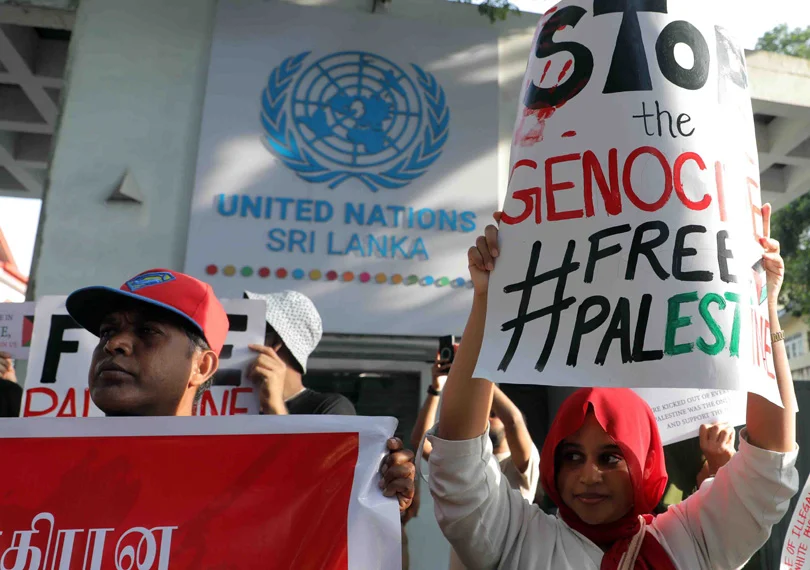Am I A Settler Too? Reflections of a Sinhalese from Sri Lanka after Gaza
Nalin Jayathunga
Mapping temporal and spatial lines between the past and the present, this reflection draws parallels between the Palestinian genocide and the Tamil genocide. It is premised on my moral conundrum of protesting the genocide currently unfolding in Gaza, while questioning my position with reference to violence perpetrated by the Sri Lankan State against the Tamil population. As such, it introspectively considers positionalities that may prevent meaningful solidarity with both the Palestinian and Tamil causes. In doing so, it questions how the Sri Lankan State obscures, invisibilises, and justifies its own complicity in violence in Palestine by first extending performative, strategic, and nominal solidarity to Gaza, but contradicts that by aligning its military and economic interests with the West and Israel.
If one imagines witnessing both the Palestinian and Tamil genocides at similar periods, can most of us in the South of Sri Lanka, who are outsiders to violence on the scale experienced in the North and East, denounce the occupation of Tamil lands, genocide, massacre, and ethnic cleansing of Tamils in the same breath we denounce Israel’s occupation, genocidal acts, and ethnic cleansing of Palestinians? Can the Sinhala Buddhist majority acknowledge the significations of the word ‘genocide’ in the context of the killing and maiming of Tamils?. Further, in the South, it is impossible to even debate the ‘armed resistance’ of the Liberation Tigers of Tamil Eelam (LTTE) as one would do in the case of Hamas, Houthis, and Hezbollah. If we cannot accept the Tamil fight for liberation on the same terms we support Palestinian liberation, it raises the question of whether our solidarity towards Palestine is only performative and limited to a digital space. In order to build more meaningful transnational solidarity with the Palestinian cause, it is necessary to draw parallels between different contexts of violence and address our positionalities, ethics, subjectivities, and deeply entrenched biases.
In Sri Lanka, while I have tried to understand how majoritarianism and ethnonationalism have long stifled minority communities, and have always considered myself an ‘ally’ to the struggles of the Tamil and Muslim population, it is only my fixation with Palestinian liberation that shockingly awakened the inner moral conundrum: “Am I A Settler Too?” I am from an urban middle-class, majority Sinhala-Buddhist ethnic and religious background. In Colombo, people were jubilant over the war ‘victory’ in 2009, aided in no small measure by the discursive and material space that the media, politics of memory, and even the education system relentlessly worked towards creating and maintaining (Perera 2016; Saravanamuttu 2022; Karunanayake 2021). At present, the similarities between the Palestinians’ suffering and the oppression of Tamil and Muslim communities in Sri Lanka, Kashmir Muslims in India, Balochs in Pakistan, and many more are becoming glaringly clear.
Although this suffering in South Asia has deep connections to Western colonial history, we must admit the role of majoritarianism in post-colonial South Asia in the continued practices of occupation, land grabbing, militarisation, violence, surveillance, and State repression. While it is fairly easy to be witness to the genocide in West Asia without guilt, is it possible to say the same about one’s own context of violence? Have the occupation of Tamil lands in Sri Lanka, militarisation, ethnic cleansing, and the genocide of Tamils become normalised to the majority in the South of Sri Lanka through State-led processes of erasure, denial of memorialisation, and censorship?
Despite such attempts by the State, the similarities of the two contexts of struggle in both Palestine and the North and East of Sri Lanka are amply clear: killing, maiming, and displacing civilians; continuing militarisation and military occupation; sexual and gender-based violence; bombing hospitals (e.g. Valayarmadam and Mullivaikkal Hospitals, Al-Ahli Arab Hospital); epistemicide: destroying knowledge-production institutions (e.g. Jaffna library, schools in Mullivaikkal, Israa University); impunity and lack of accountability; dehumanising the Other; settler colonialism; State justification tropes (terrorism, self-defence) with no heed to State terrorism; State narratives of “civilians as human shields”, collateral damage, and war ‘victories’; support by the West; humanitarian aid by the West while supporting the continuation of violence; framing the “victims” of terrorism by media; and media censorship. Notwithstanding these similarities, the Sri Lankan State expresses solidarity with Palestine, while invisibilising its own complicity in the violence.
Contradictions of Sri Lankan State Support to Palestine
The Sri Lankan government’s support towards the Palestinian cause was initially paradoxical considering its affinity to Israel, the US, and the West as perpetrators of war crimes. However, it is naïve to think that geopolitics surrounding the financing of war and capitalism is straightforward and unambiguous. While there is history of consecutive Sri Lankan governments expressing support for Palestine, such support has often been merely conditional and nominal, usually extended in forums such as the United Nations which have proven time and again to be failures in terms of finding meaningful redress for the suffering of Palestinians. This solidarity has not translated into action.
Thus, while the Government of Sri Lanka (GoSL) supports Palestine at grossly failed international forums, the Sri Lankan Navy joins the US-led Red Sea operations to fight the Houthi rebels who are blocking the passage of ships to Israel. Resisting imperialist and Zionist agendas and fighting for Palestinian liberation, Houthi rebels form an important part of the ‘Axis of Resistance’ which currently conducts three coordinated battle arenas outside of Gaza: 1) Hezbollah’s moderate-intensity war with Israel; 2) the Popular Mobilisation Units’ attacks on US and Israel; and 3) Houthi rebels’ attacks in the Red Sea (Saad-Ghorayeb 2024). Attempts by the West to frame them as terrorist organisations fail in the field of international law, and reflect neither the political reality nor public opinion across the Arab and Islamic world (Saad-Ghorayeb 2024). Instead, “Together they form a strategic axis — the “axis of terror” to Israel — that confronts US-Israeli designs to redraw the map of the region” (Saad-Ghorayeb 2006, p.1). Against this backdrop, Sri Lanka’s support towards Palestine is hypocritical as it contradicts its feigned solidarity by pursuing economic and military actions that are harmful to the Palestinian cause.
In addition to extending military support, the Sri Lankan government, in its desperate attempt to secure foreign remittances to climb out of the economic (particularly forex) crisis, is now dispatching workers to Israel for precarious, exploitative work. This is further facilitated through the direct air service agreement signed between Sri Lanka and Israel in February 2024. These workers are mostly concentrated in the informal economy, who have been devastated by Sri Lanka’s economic crisis and IMF-led austerity measures. Their vulnerabilities and conditions of precarity are further reproduced through these arrangements.
To understand the Sri Lankan state’s duplicitous stand on the Palestinian question, the export of workers needs to be complicated by the expulsion of Palestinian workers that preceded the present arrangement. Since the escalation of violence in October 2023, Israeli authorities have revoked the work permits of Palestinians, imposed severe restrictions on workers’ mobility, and even had their salaries frozen. According to a recent International Labour Organisation (ILO) report (2024), while 20,000 Gazans previously employed in Israel have lost employment; in the Gaza Strip 66% of employment has been lost. From the West Bank, out of 171,000 workers formerly employed in Israel, only a mere 10,000 are currently working there. In total, an estimated 468,000 jobs have been lost, which is equivalent to 40% of total employment in the Occupied Palestinian Territory. Notably, this report estimates the Palestinian economy to have shrunk by one-third while the unemployment rate has increased up to 46.1% in the 4th quarter of 2023.
In this context of replacing Palestinian workers, not only Israel but also Sri Lanka as a sending country is complicit in weaponising labour to debilitate Palestinian livelihoods and the economy. On the part of the GoSL, a section of the country’s workforce is treated as mere commodities to be exported to precarious conflict zones to salvage the crippled economy while disregarding their security risks and vulnerabilities. While the government portrays this as finding foreign job opportunities for those affected by economic hardships, the systematic structures that produce those very economic vulnerabilities in Sri Lanka are further exacerbated.
These contradictory actions are testimony to the GoSL’s attempt to invisibilise its own complicity in this situation. This is made further evident through the recent remarks of Foreign Minister Ali Sabry at the high-level segment of the 55th session of the United Nations Human Rights Council (UNHRC). While rejecting resolutions 46/1 and 51/1 and the external evidence-gathering mechanisms proposed for Sri Lanka, he invoked the plight of the Palestinians strategically to obscure, invisibilise, and justify Sri Lanka’s own complicity:
How the Council approaches the humanitarian crisis in Gaza will be another litmus test to its credibility as the foremost international human rights body … We reiterate the importance of avoiding double standards being practiced at this Council. The suffering of innocent civilians must not be overlooked in the pursuit of political agendas, and urgent action is needed to alleviate their plight. (Sabry 2024)
This reductionist invocation of the Palestinians’ plight by the GoSL aims to normalise the continued stripping of Tamil people’s rights, against a backdrop where the ‘imagined’ GoSL solidarity towards Palestinians contradicts itself in its ‘material’ reality: when all the oppressive States (Sri Lanka, Israel, and the West) join hands economically and militarily to defeat the Palestinian cause. This contradictory relationship reveals the individualistic and ruthless nature of capitalism, colonialism, and nation-states. Moreover, it exemplifies how nation-states instrumentalise complexities and ambivalences of violence to benefit the agendas of the oppressors.
References
International Labour Organisation. (2024). Report on Crisis-related ILO work in the Occupied Palestinian Territory. Available at https://www.ilo.org/wcmsp5/groups/public/—ed_norm/—relconf/documents/meetingdocument/wcms_914521.pdf
Karunanayake, Ashawarie. (2021). “Constructing the image of soldiers by using newspaper media during the final phase of war in Sri Lanka”. Journal of Original Studies, 2(2): 87–97.
Perera, Sasanka. (2016). Violence and the Burden of Memory: Remembrance and Erasure in the Sinhala Consciousness. Delhi, India: Orient Blackswan.
Saad-Ghorayeb, Amal. (2006). “The framing of Hizbullah”. The Guardian (15 July). Available at https://www.theguardian.com/commentisfree/2006/jul/15/syria.israel
——. (2024). “The Houthis are not a group that can be bombed into extinction – here’s why”. The Guardian (23 January). Available at https://www.theguardian.com/commentisfree/2024/jan/23/houthis-hamas-israel-iran-axis-resistance
Sabry, Ali. (2024). “Foreign Minister Ali Sabry addresses the High-level Segment of the 55th Session of the UN Human Rights Council”. Ministry of Foreign Affairs-Sri Lanka. Available at https://mfa.gov.lk/fmsl-addresses-55th-session-unhrc/
Saravanamuttu, Paikiasothy. (2022). “Victory Celebration and the Unmaking of Diversity in Post-war Sri Lanka”. In Neloufer de Mel and Guy Elcheroth (eds.). In the Shadows of Transitional Justice: Cross-national Perspectives on the Transformative Potential of Remembrance (51-63). London and New York: Routledge.
Nalin Jayathunga is an independent researcher with interests in development studies and gender and sexuality studies.

